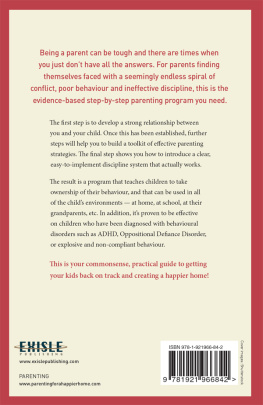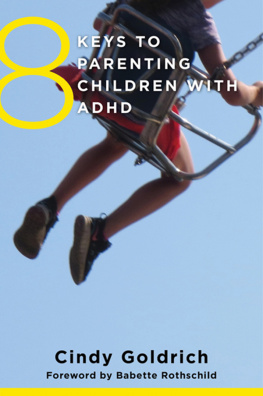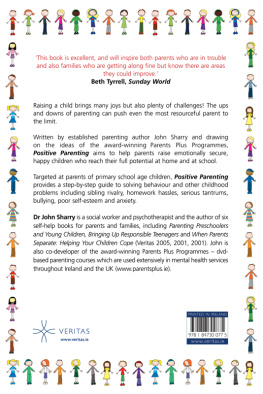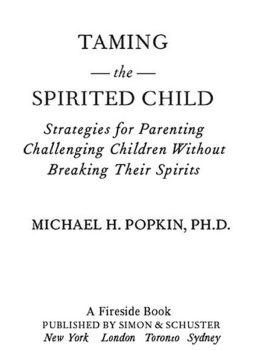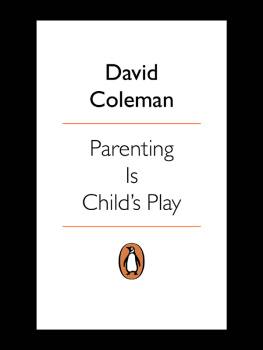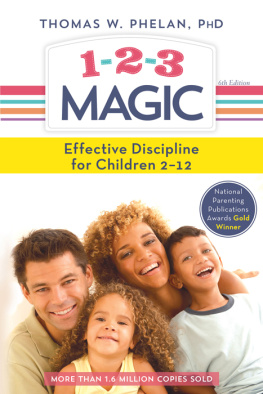Parenting
for a
Happier
Home
THE STEP-BY-STEP GUIDE TO
KEEPING YOUR KIDS ON TRACK
STUART PASSMORE
BSc (Psych.), Honours (Psych.), Cert. Psych. Counsel.

Stuart Passmore is a psychologist in private practice, with extensive experience in working with individuals, couples and families. Stuart specializes in parenting children with behavioural disorders and noncompliant behaviour.
Also by Stuart Passmore and Exisle Publishing:
The ADHD Handbook
ISBN 978-1-921966-11-8

CONTENTS
To my wife and children, thank you
for all your patience and support.
To my father in heaven,
I dedicate this book to you.
Introduction
Parenting is perhaps one of the greatest rewards of human experience. The indescribable joy of being present at the birth of your child and holding that tiny and vulnerable little person in your arms for the very first time. The innocence of those big eyes staring deeply into yours, the big gummy smiles, the precious attempts at saying Dada or Mama, and those special moments when they fall asleep in your arms or snuggle deeply into your neck. But for some, parenting can also be one of the most difficult jobs in the world.
Some children just seem to be difficult right from birth. They are difficult to console when they get upset and they seem to resist every effort to comfort them. They have tantrums, they are defiant, they argue with you and demand their own way and continue to disobey you or completely ignore your instructions. They can steal from you, push you, hit you, run away, lie to your face and find themselves in trouble with the law. Sometimes a childs unusual and difficult behaviour is a result of developmental and behavioural disorders such as Autism Spectrum Disorder, Oppositional Defiance Disorder or Attention DeficitHyperactivity Disorder.
But not every challenging child has a behavioural disorder; some children are just plain difficult, defiant and aggressive. Parents of such taxing children find that parenting can become very, very difficult. The constant strain and demands of parenting such children often places enormous stress on the parents. I cant tell you how many times Ive heard parents tell me things like I hate my life, or I just cant take this any more, or I cant help but think if he wasnt in our life, things would be so much easier, or I walked out of the house this morning and I did not want to come back, or Ive just called the police to deal with my child. Sometimes parents find themselves in a state of desperation while trying to control their childs behaviour and they begin having thoughts that really scare them. Some parents have thoughts of hurting their children, others of abandoning their children, and still others of adopting or fostering their child out, while some parents have suggested that they would be happy to just fall asleep and never wake up again. This constant strain and desperation can often leave such parents feeling alone and isolated, believing that no one understands their situation and that they have no external support.
Parenting for a Happier Home has been written with the intention of supporting all parents, but especially those parents who are at their wits end and feel as though they have nowhere else to go. This book has been written with those parents in mind whose children have behavioural disorders, are defiant or who have explosive behaviours, or are just plain difficult to manage. It is based on the RANE Parenting Program I developed over a number of years using the most up-to-date professional literature and research. As you read through this book, it is anticipated you will begin to realize just how important your parenting skills are for the wellbeing of your child and for maintaining a healthy relationship with your child. Unfortunately by the time most parents seek the professional help they need, the situation at home with their child has become, or is rapidly becoming, desperate. The parentchild relationship often begins to deteriorate with parents feeling powerless to alter their childs behaviour. This adds further strain in the home and can create a greater feeling of desperation for the parent.
Over the years many, many parents have sought my help and one of the things that is most evident to me is their vulnerability and their fear of being told what awful parents they are, how they have totally failed as parents, and of being blamed for their childs behaviour. According to the professional literature, various parenting styles have been found to underscore a deteriorating parentchild relationship and have also been directly linked to acting out, aggressive and delinquent behaviour in children. But one thing needs to be clear right from the start this book is not about pointing the finger of blame. This book not only aims to provide current thinking on the issues of parenting but further seeks to unite a number of diverse disciplinary perspectives to provide an understanding of the parenting techniques, skills and strategies that are considered to be the most adaptive and functional, and that are most respectful of both the child and the parent.
Parenting for a Happier Home is divided into two sections. and the way you typically respond to your child. Each chapter has accompanying homework to give you an opportunity to apply your new skills in a variety of situations.
of the book is concerned with discipline. It is widely accepted in the professional world that harsh, punitive punishment is ineffective in modifying a childs problematic behaviour in the long term. The child will stop their misbehaviour in the short term but wont have learned the lesson. Further, harsh punishment does not provide children with an appropriate reason to modify their behaviour; the unfavourable behaviour is likely to continue. There are some serious problems with corporal punishment that lie within the emotionally charged nature of the parentchild relationship in homes where the childs behaviour is difficult to manage. Simply put, it doesnt take much for an exhausted, stressed and angry parent who feels pushed to the edge to discipline their child in anger. Unfortunately this discipline is often harsh and punitive, and risks maintaining the childs problematic and/or aggressive behaviour.
We have all heard at one time or another that corporal punishment can and does lead to physical abuse. A parent lashing out at their child in anger also runs the risk of physically hurting their child. But what is not always so obvious is the potential emotional and psychological damage corporal punishment can do to a child. One teenage boy reported that when his mother was angry with him she would lash out and strike him in the face while screaming, You stupid, stupid boy! According to the teenager he didnt remember the physical pain of being slapped in the face, but the words his mother screamed at him cut deep. Is it any wonder that harsh, punitive punishment jeopardizes and damages the parentchild relationship and potentially causes more difficult behaviour from your child?
Effective discipline must include children receiving appropriate instruction and guidance for socially acceptable behaviour. Keeping this in mind, the chapter on discipline in also covers the complex issues of household chores, pocket money and the issue of rewarding children for their efforts and compliant behaviour. Principally, household chores are all about the child learning to take responsibility for themselves and becoming a responsible member of the family. As a member of the family unit, a child ought to learn to take on family responsibilities that also serve to support the unique needs of each family. As the original meaning for the term discipline is to teach, to guide and to instruct, teaching a child how to become responsible is a natural part of discipline.
Next page
